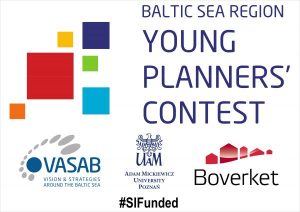 On August 26-29 our Faculty hosted the Baltic Sea Region Young Planners’ Contest, a summer school combined with a competition for young planners under the title “Liveable Places and Spaces of Tomorrow”. 60 candidates from 10 countries of the Baltic Sea region associated in VASAB (i.e. Finland, Estonia, Latvia, Lithuania, Germany, Sweden, Belarus, Denmark, Russia and Poland) submitted their applications. 40 participants were qualified, including both students and practitioners. Architects, urban planners, planners, graphic designers and young scientists were the most represented. The upper age limit of participants was 35 years.
On August 26-29 our Faculty hosted the Baltic Sea Region Young Planners’ Contest, a summer school combined with a competition for young planners under the title “Liveable Places and Spaces of Tomorrow”. 60 candidates from 10 countries of the Baltic Sea region associated in VASAB (i.e. Finland, Estonia, Latvia, Lithuania, Germany, Sweden, Belarus, Denmark, Russia and Poland) submitted their applications. 40 participants were qualified, including both students and practitioners. Architects, urban planners, planners, graphic designers and young scientists were the most represented. The upper age limit of participants was 35 years.
The competition was opened by Alda Nikodemus from VASAB in the presence of prof. Anna Tobolska – Deputy Dean of the WNGiG and prof. Paweł Churski – Director of IGSEiGP. Prof. Jacek Zaucha from the University of Gdańsk delivered an introductory lecture on contemporary development trends and challenges for the Baltic Sea region. The participants spent the afternoon on a trip around the center of Poznań, during which dr Łukasz Mikuła presented the most important aspects of spatial planning. The first day of the event ended with a gala dinner at Collegium Geographicum.
During the next two days, the main task of the participants divided into eight international teams was to develop original spatial and strategic solutions that would be possible to implement in the Baltic Sea region. Young planners were looking for a solution to contemporary social, economic and environmental problems, including restrictions spatial accessibility, climate change, unfavourable demographic processes and challenges of maritime spatial planning. The methodological concept of the competition was elaborated by dr Przemysław Ciesiółka and dr Tomasz Kossowski.
During conceptual work, project teams were also substantively supported by invited experts from Poland and abroad, including prof. Jacek Zaucha from the University of Gdańsk, dr Maria Gunko from the Russian Academy of Sciences, Jonas Büchel from the Urban Institute in Riga, Per Stenholm from Boverket in Sweden and Vita Brakovska from the Latvian Knowledge and Innovation Society. The team of mentors was headed by dr Tomasz Kossowski.
The final gala took place on Thursday, August 29. All project teams presented their concepts on posters and during short speeches. Each presentation ended with a discussion of the proposed solutions and questions from the jury, which included: Talis Linkatis (Minister of Transport of Latvia), Wilfried Görmar (former chairman of VASAB), Åsa Bjering (CPMR BSR), prof. Paweł Churski and Vita Brakovska. The competition entries included a proto vision, the concept of a transport loop around the Baltic Sea or a modern food management system, the effect of which would be to reduce the area of crops.
The voting carried out among the participants was won by the Unifying Baltic Belt Rethinking Borders proposal, calling for the abolition of state borders in the Baltic Sea coastal zone by 2050. In turn, the main prize, which was a trip to the Young Planners’ Conference 2019 in Newcastle, was awarded by the jury to the concept of The Bolticfleet , authored by Veli-Matti Lappi (Finland), Nicoline Løcke Zabel (Denmark), Ieva Nagle (Latvia) and Vincent Prats (Sweden). They proposed a solution to include improve the availability of services in rural areas while reducing the need for private transport.
The Baltic Sea Region Young Planners’ Contest was organised by the Institute of Socio-Economic Geography and Spatial Management in agreement with Boverket (Swedish National Board of Housing, Building and Planning) and VASAB (Vision & Strategies Around the Baltic Sea) Committee of Spatial Planning and Development , and financed by the Swedish Institute. Project coordinators from the University of Adam Mickiewicz were prof. Paweł Churski, prof. Krzysztof Stachowiak and dr Bartosz Wojtyra. The work of the organising committee was additionally supported by students.
Photos from the event can be found under this link.
